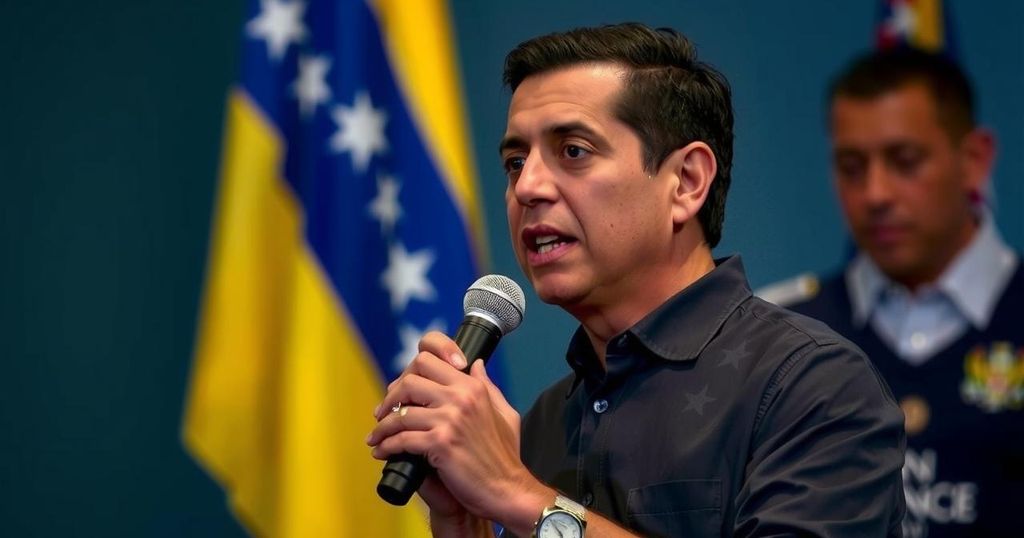Politics
ANTONY BLINKEN, BLINKEN, BRAZIL, CARTER CENTER, COLOMBIA, CUBA, DEMOCRACY, ELECTION, EUROPEAN UNION, GIL, GONZALEZ, NATIONAL ELECTORAL COUNCIL, NICOLAS MADURO, NORTH AMERICA, POLITICS, PRESIDENTIAL ELECTION 2024, SOUTH AMERICA, SUPREME TRIBUNAL OF JUSTICE, TRADE RELATIONS, UNITED NATIONS, VENEZUELA
Marcus Li
0 Comments
U.S. Recognizes Opposition Candidate Edmundo Gonzalez as Venezuela’s President-Elect
The U.S. has recognized Edmundo Gonzalez as Venezuela’s “president-elect” months after President Maduro’s disputed election win. Secretary of State Antony Blinken called for respect for voter will. Despite Gonzalez’s claims of winning with double the votes, Maduro’s regime faces criticism for lack of transparency in the electoral process, as international observers question credibility. Meanwhile, the situation escalates with Gonzalez’s exile and Colombia’s President Petro’s shift in opinion on the elections.
On Tuesday, the U.S. government recognized Venezuelan opposition candidate Edmundo Gonzalez as the “president-elect” of Venezuela, months after President Nicolas Maduro’s contentious announcement of his re-election victory in July. U.S. Secretary of State Antony Blinken emphasized the importance of respecting the will of Venezuelan voters in a statement on X. Although the Biden administration acknowledged that Gonzalez received the most votes in the disputed election held on July 28, it had refrained from officially recognizing him as president-elect until now. The recognition comes after significant concerns regarding the transparency of the electoral process, dominated by Maduro loyalists. Following the election, Maduro’s National Electoral Council quickly declared him the winner without providing detailed voting counts, raising questions from both national and international observers. In contrast, the opposition coalition, having garnered data from 80% of Venezuela’s electronic voting machines, asserted that Gonzalez won with double the votes of Maduro. Upon receiving recognition from the U.S., Gonzalez expressed gratitude on X, stating that it honors the Venezuelans’ desire for change and the collective effort demonstrated during the election. Gonzalez sought exile in Spain after an arrest warrant was issued against him amid an investigation into vote tally sheet publications. The Venezuelan foreign minister retaliated to Blinken’s remarks with personal criticisms, asserting that he should reflect on his governmental failures. Meanwhile, Maduro has faced criticism for his refusal to provide comprehensive vote records, prompting calls for increased transparency from various countries and organizations. Maduro’s Supreme Tribunal, which supports his regime, conducted an audit but reaffirmed his election victory, further exacerbating the situation. Observers from the United Nations and the Carter Center noted concerns about the credibility of the results declared by electoral authorities, though they did not conclusively validate Gonzalez’s claims. In a significant shift, Colombian President Gustavo Petro distanced himself from the July elections, labeling them a “mistake” in a recent interview. This change of stance highlights the broader discontent related to the electoral process in Venezuela, particularly as Maduro prepares for a new presidential term commencing on January 10. Before this date, communications among leftist leaders attempted to foster peace but ultimately yielded no substantial results.
The recognition of Edmundo Gonzalez by the U.S. government highlights the ongoing political turmoil in Venezuela. Following a disputed election marked by accusations of election manipulation and a lack of transparency, the U.S. has intervened in supporting opposition claims against President Nicolas Maduro. The electoral process criticized for its integrity raises further questions regarding democratic practices in Venezuela, in which the Maduro regime has faced opposition both domestically and internationally. Understanding the dynamics at play in this politically fraught environment is crucial for comprehending future developments in Venezuelan governance.
In conclusion, the recent acknowledgment of Edmundo Gonzalez as the “president-elect” by the U.S. marks a pivotal moment in Venezuelan politics amidst a backdrop of election disputes. As international scrutiny intensifies regarding Venezuela’s electoral integrity, the implications of this recognition may influence future political engagements and the opposition’s efforts to establish credibility against the Maduro administration. The developments signal a growing frustration with the lack of transparency and a collective yearning among the Venezuelan populace for political reform and accountability.
Original Source: www.voanews.com




Post Comment